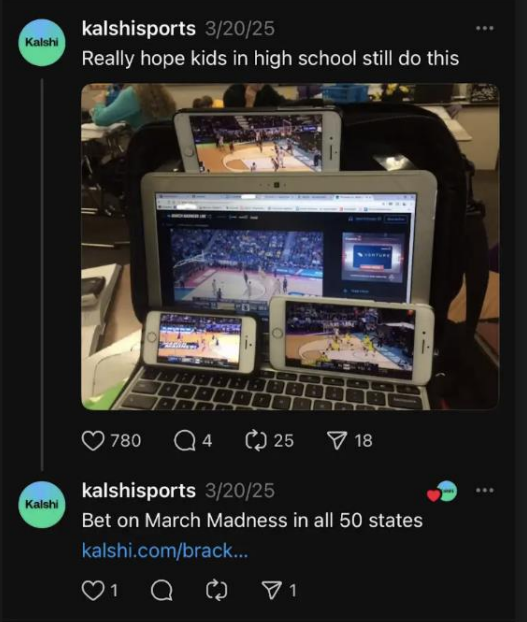A lawsuit filed by three California tribes against Kalshi’s sports event contracts took a new turn Friday, as the tribes called for a judge to issue an injunction forcing Kalshi to stop offering sports event contracts on tribal lands. And pomegranate juice might be key.
Three California tribes — the Blue Lake Rancheria, Chicken Ranch Rancheria of Me-Wuk Indians, and Picayune Rancheria of the Chukchansi Indians — urged the U.S. District Court for the Northern District of California to grant the injunction, saying they are likely to suffer “irreparable harm” if Kalshi is allowed to continue offering bets on sports.
The tribes first sued Kalshi, as well as Robinhood — which offers access to Kalshi contracts — in July.
MotionThey argue that the sports event contracts — allowing users to stake money on the outcomes of sporting events, and now player stats too — violate the federal Indian Gaming Regulatory Act (IGRA). It says they are a form of Class III Gaming — the highest class of gaming under IGRA that typically includes sports betting — and are available on tribal lands. Tribes in some states, including California, have exclusivity for gaming on their lands under IGRA and tribal-state compacts.
Kalshi has generally argued that it is governed by the Commodity Exchange Act (CEA), as it is regulated by the Commodity Futures Trading Commission (CFTC). In previous cases, it has claimed that the CFTC has “exclusive jurisdiction” over any contracts offered by a CFTC-registered designated contract market, and therefore only the CFTC can determine its contracts are unlawful.
While those previous cases have concerned whether sports event contracts violate state law, if Kalshi believes the CFTC’s jurisdiction over its contracts is “exclusive,” then it would follow that other federal bodies or laws could not block the contracts either.
But the tribes say this is not a correct interpretation of the law. It says that granting the CFTC the power to allow gaming on tribal lands would be in violation of IGRA, and could lead to repealing the law without having mentioned doing so. Judges are generally skeptical of the view that Congress would repeal a law without specifically making its intention to do so clear.
“IGRA comprehensively regulates one subject: gaming on Indian lands, without exception,” the tribes’ motion for an injunction reads. “Interpreting the CEA to permit gaming contracts that constitute sports betting — or activity that otherwise falls within the scope of gaming activity under IGRA — on Indian lands would be tantamount to an implied repeal of IGRA.”
It added a quote from a Supreme Court opinion written by Justice George Sutherland in 1936, which said. “The cardinal rule is that repeals by implication are not favored.”
The tribes attached a proposed injunction order, that if signed by a judge would prevent Kalshi from offering sports event contracts on tribal lands, as well as blocking the prediction market from marketing its sports contracts as “legal in all 50 states.”
Different legal principle
The California case looks to hinge on a different legal principle than Kalshi’s lawsuits against the states of Nevada, New Jersey, and Maryland. Those cases were mostly about the circumstances in which federal law could overrule state law, and specifically whether the CEA superseded state gaming laws. But IGRA, like the CEA, is a federal law, so in this case courts must consider how the two federal laws might interact.
“This new motion tees up a key issue for the federal judge about whether IGRA and CEA can co-exist at a time of rapid sports betting expansion,” an academic legal source who has been following the prediction market litigation closely but is uninvolved in any of the cases told InGame.
“Just over a decade ago, the U.S. Supreme Court concluded that ‘it would show disregard for the congressional design to hold that Congress nonetheless intended one federal statute to preclude the operation of the other’ when the two laws complement each other.’”
The case the source refers to — POM Wonderful LLC v Coca-Cola Co. — might be one that we will soon hear a lot more about.
It’s all about pomegranates
The POM case — first filed in the U.S. District Court for the Central District of California in 2008, ultimately making its way to the Supreme Court in 2014. It offers key guidance for certain circumstances where two federal laws appear to overlap.
What does it have to say about sports event contracts?
Well, in 2007, Coca-Cola-owned Minute Maid introduced a new pomegranate blueberry juice, capitalizing on broader late-2000s trend in popularity for the fruit.
But pomegranates and blueberries are expensive, so 99.4% of the Minute Maid drink was instead made up of apple and grape juice.
Officially, the drink was a “pomegranate blueberry flavored blend of 5 juices,” though those last five words appeared in small type on the bottle.
POM Wonderful — which sold its own pomegranate blueberry juice, with its juice content made up only from the two titular fruits — sued, arguing Coca-Cola was guilty of false advertising under the federal Lanham Act, which governs misleading marketing practices.
The beverage behemoth pointed to the Food, Drug, and Cosmetic Act (FDCA), also a federal law. It said that as the juice and its labeling are governed by this law, and regulated by the FDA, other parties cannot bring a suit based on its labeling. If approved by the FDA, Coca-Cola argued, the beverage label must be permitted.
As long as the juice was an FDA-regulated product, Coca-Cola argued, only the FDA could enforce of whether it was marketed appropriately. It discussed, “Congress’s decision to entrust matters of juice beverage labeling to the FDA,” and said the legislature “provided the exclusive means of enforcing the FDCA” through the FDA, noting the need for “national uniformity” in labeling.
That may sound similar to Kalshi’s arguments regarding the CEA and CFTC.
Lower courts agreed with Coca-Cola, but the case ultimately reached the Supreme Court, which ruled in favor of POM.
Writing the opinion following a unanimous decision (with one justice absent), Justice Anthony Kennedy said that being regulated primarily by the FDA shouldn’t make Minute Maid’s labeling immune from challenges under another law.
“Though the FDA’s rulemaking alludes at one point to a balance of interests, it neither discusses nor cites the Lanham Act; and the Government points to no other statement suggesting that the FDA considered the full scope of interests protected by the Lanham Act,” Kennedy wrote. “Even if agency regulations with the force of law that purport to bar other legal remedies may do so, it is a bridge too far to accept an agency’s after-the-fact statement to justify that result here.
“An agency may not reorder federal statutory rights without congressional authorization.”
Tribes use the Lanham Act
The relevance of POM isn’t just about the conflict between the CEA and IGRA as two federal laws, though.
The tribes specifically argue that not only do Kalshi’s offerings violate IGRA, but they also violate The Lanham Act, the exact law that POM used to sue Coca-Cola.
Kalshi has repeatedly marketed its games as “legal sports betting,” or similar language. This, the tribes say, is misleading.
The filing points to Kalshi’s use of the CFTC’s self-certification process — which it uses to list sports event contracts — as evidence of that the contracts are not truly legal betting.
Self-certification is a process by which a registered exchange tells the CFTC that it plans to list a new type of market. If the CFTC doesn’t take action, the market is treated as if it is allowed. However, the tribes argued that the difference between self-certification with no response and actual permission is not simply a semantic one.
“The CEA and CFTC regulations do not require that the CFTC review every proposed contract or swap, and the CFTC staff lacks the resources to review Kalshi’s expanding gaming contract market,” the filing says.
The CFTC has been particularly short-staffed lately due to a spate of commissioner resignations. Currently, Acting Chair Caroline Pham is the only commissioner at the regulator. The tribes argue that in practice, Kalshi is its own regulator.
The filing goes on to note that the CFTC rules around self-certification say that if a potential new product could present “compliance issues,” self-certification notices should explain how it is in the public interest. Kalshi’s submissions, the tribes say, fail to do this, and “therefore, are presumptively prohibited and therefore presumptively unlawful.”
Tribes show Kalshi marketing screenshots
Besides calling Kalshi’s sports event contracts unlawful, the tribes produced plenty of evidence that the contracts are also advertised in a misleading way. Attached to the motion were 88 exhibits, of which 82 were either screenshots of Kalshi social media posts describing its products as “bets” or similar phrases, or of comments on those social media posts referring to “bets” or questioning the legality of the products.

Skyler Kretz, an intern with the tribes’ lawyers, took all 82 screenshots over the course of six days.
The tribes argue that these screenshots are proof that “Kalshi’s myriad false and misleading statements about its platform, products, and services violate [the Lanham Act]. Their commercial advertising deliberately confuses consumers as part of a broader marketing strategy to attract a large consumer base.
“Granting an injunction is necessary to protect consumers from confusion resulting from Kalshi’s false and misleading marketing practices.”
Kalshi-California-Tribes-DocumentsInjunction could be costly
The call for an injunction to block the contracts flips the script from Kalshi-versus-state cases. In lawsuits against the states of Nevada, New Jersey, and Maryland, Kalshi sued for injunctions that would have allowed it to keep offering sports event contracts. In this case, the injunction would be to block them.
Kalshi was successful in its bids for injunctions in Nevada and New Jersey, but not in Maryland. However, its sports event contracts are still available in all 50 states, as Maryland agreed not to enforce its gaming laws against the prediction market until the Fourth Circuit Court of Appeals rules on Kalshi’s attempt to appeal the denial of the injunction.
If approved, the injunction could be very costly to Kalshi. The total population of tribal lands is less than 1% of the U.S. population, and so may not represent a huge share of Kalshi’s business. However, providing adequate geolocation services to ensure that nobody is using the site or app from an excluded area may be much more expensive.
In a case against the state of Maryland, Kalshi said that developing geolocation capabilities “would, at minimum, take months and cost tens of millions of dollars.”
Tens of millions of dollars would be roughly on the order of Kalshi’s entire 2025 revenue so far. While that figure is simply the estimate by Kalshi, which may have had reason to estimate a higher cost in order to show that adding geolocation would be a burden, there is no doubt that the service is costly.
Manu Gambhir, CEO of geolocation business XPoint, told Casino Reports that the regulated U.S. sports betting and iGaming sectors collectively spend between $200 million and $250 million a year on geolocation.
Given that geoblocking tribal lands would involve a number of different borders across the entire U.S., that may be even more expensive than one operator doing so for one state.
In addition, Kalshi has argued in cases against states that it cannot simply shut off access to a state. Doing so, it says, would violate the CFTC’s requirement for “impartial access” to its markets. If this would also apply to geoblocking tribal lands — which are sovereign nations — then Kalshi may have to instead block access to all its sports event contracts — the core of its business — nationally.
One lawyer ‘skeptical’ of injunction
But there is a key difference to the 2014 case — POM Wonderful sold pomegranate-blueberry juice.
As a direct competitor to Minute Maid’s products, it was easy to show that POM was affected directly by its advertising practices.
California tribes don’t offer sports betting, so their competition with Kalshi is more indirect. Much of the harm mentioned in the filing instead refers to the harm to tribal sovereignty caused by allowing another entity to offer Class III gaming on tribal lands.
“Without preliminary injunctive relief, the impermissible interference with tribal self-government will persist and frustrate the purposes for which IGRA was enacted — to promote tribal sovereignty, self-determination, and economic self-sufficiency of tribal governments,” the tribes wrote.
While loss of sovereignty is certainly a significant form of harm in itself, it may not be enough to convince a judge to grant an injunction.
Andrew Kim, a partner at the Goodwin law firm who specializes in gambling, wrote in a thread on social media site X he was “skeptical” that the tribes would win an injunction. One challenge, he noted, was arguing that they would suffer “irreparable harm.”
The argument of harm caused by a possible loss of sovereignty, Kim writes, has previously not persuaded judges to grant injunctions. And the Lanham Act claims, he says, have typically been brought by direct competitors or those who suffer “commercial” injury from the misleading advertising, as opposed to other harms.
“Preliminary injunctions also require a showing of irreparable harm. The Tribes claim an irreparable injury to their sovereignty, which is an important interest that Judge Corley must take seriously,” he wrote.
“But I don’t know how the irreparable harm analysis shakes out here. If the Tribes could show that Kalshi’s activities are impeding their efforts to secure a Class III compact that includes sports betting, sure — maybe there’s a case for irreparable harm.”
But even if there is no injunction in this case, expect to hear more about the relevance of the pomegranate juice case with regard to Kalshi and the tribes.
Similar case in Wisconsin
Last month, the Ho-Chunk Nation of Wisconsin filed a lawsuit against Kalshi that is very similar to the California suit. Like the California tribes, the Ho-Chunks accuse Kalshi and Robinhood not just of violating IGRA, but also of breaking the Racketeer Influenced and Corrupt Organizations (RICO) Act by teaming up to offer sports event contracts.
It remains to be seen whether the Ho-Chunks will follow the California tribes with a similar call for an injunction in Wisconsin.







